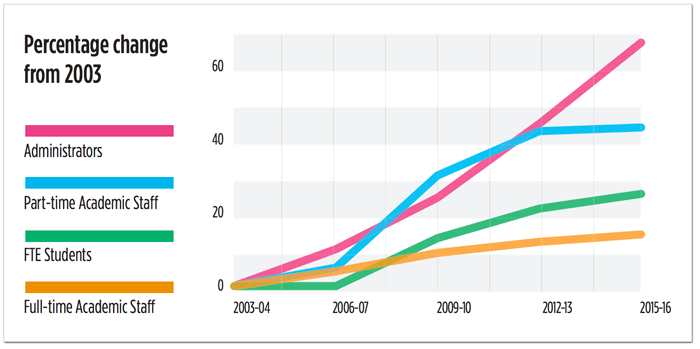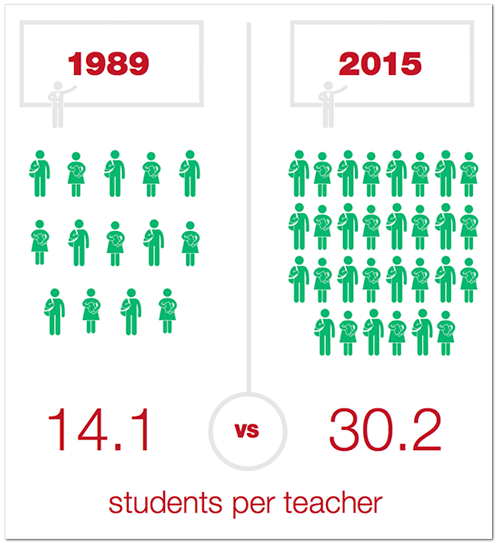
Faculty at Ontario’s Colleges Just Went on Strike. Here’s What They’re Fighting For.
They're leading the fight against precarious work.
Thousands of faculty at 24 colleges in Ontario are heading to the picket line in a battle over the explosion of precarious work at Ontario’s college campuses.
The 12,000 professors, instructors, counsellors and librarians represented by the Ontario Public Service Employees Union were forced to strike after management rejected a final offer from the union to end systemic job insecurity at Ontario’s colleges.
In its rejected final pitch to the College Employer Council, OPSEU listed the following asks as bare minimum requirements for striking a deal:
- Colleges agree to end their dependence on temporary contract work by adopting a 50:50 ratio between full-time and contract faculty.
- Colleges agree to increase job security for part-time faculty.
- Colleges grant academic freedom to faculty, giving them a stronger voice in academic decision-making and protect the integrity of their work.
The union’s demands highlight the increasingly insecure working conditions for faculty at Ontario’s colleges and the erosion of quality as the provincial government has reduced funding.
Here are a few reasons why the working conditions facing faculty at Ontario’s colleges is actually a symptom of what’s being called Ontario’s “Walmart model of (postsecondary) education.”
The rise of contract work at Ontario colleges
According to data from the College Employer Council, part-time contract instructors now make up a staggering 70% of all Ontario college teachers.
In the last decade alone, the number of part-time contract teachers at Ontario colleges have exploded, growing at more than double the pace of full-time academic staff.
Meanwhile, the number of college administrative staff has increased by more than 77% – working out to one administrator for every three full-time faculty members (Ontario high school’s have one administrator per 12 teachers, by comparison), something OPSEU suggests is a symptom of how Ontario’s “college education is being re-shaped according to a corporate model.”

OPSEU
College teachers are struggling to make ends meet
Even though they’re doing the same work as full-time faculty, teachers working on contracts are paid well below Canada’s median income earning an average of less than $30,000 per year with no benefits or job security.
What’s more, those teachers are usually assigned classes at the last minute with no no time to prepare or meet with students, plus many college teachers in Ontario are forced to overload their teaching schedules or work multiple jobs just to make rent and pay their bills.
And as one contract instructor points out, under existing working conditions, many college teachers are effectively earning little more than minimum wage:
“Course development (some of which I have done from scratch) and maintenance (keeping up with current research) is time consuming, as is marking of tests and assignments, student contact (whether in person or my email), upkeep of online resources, and administrative functions.
When I factor these activities in, I am likely making just over the provincial minimum wage.”
Trapped in a cycle of job insecurity at Ontario colleges
Another problem facing contract faculty is there is no “recognition of seniority.”
OPSEU points out contract instructors are forced to reapply for the same jobs each semester – regardless of how good they are or how long they’ve taught a course, experience and seniority don’t offer contract faculty a clear path to full-time positions.
“Too often in the current context,” OPSEU notes, “these faculty are left trapped in an ongoing cycle of short-term contracts.”
Rising class sizes at Ontario colleges
At the same time as colleges have shifted to part-time contract faculty, the number of students enrolled in college courses has exploded.
College enrollments have doubled since 1989, yet there are now “roughly 1,000 fewer full-time faculty to teach 100,000 more students” than there were 28 years ago.
As a result, this is undermining the integrity of Ontario’s college system – Ontario college students are now “paying more for reduced access to securely employed and fairly-compensated faculty who can focus on students’ needs in the short- and long term.”

Our journalism is powered by readers like you.
We’re an award-winning non-profit news organization that covers topics like social and economic inequality, big business and labour, and right-wing extremism.
Help us build so we can bring to light stories that don’t get the attention they deserve from Canada’s big corporate media outlets.
Donate



